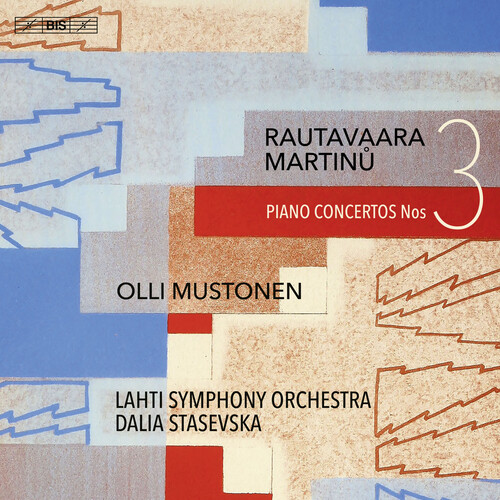Show results for
Deals
- 4K Ultra HD Sale
- Action Sale
- Alternative Rock Sale
- Anime sale
- Award Winners Sale
- Bear Family Sale
- Blu ray Sale
- Blues on Sale
- British Sale
- Classical Music Sale
- Comedy Music Sale
- Comedy Sale
- Country Sale
- Criterion Sale
- Drama Sale
- Electronic Music sale
- Golden Age of Hollywood sale
- Horror Sci fi Sale
- Kids and Family Sale
- Metal Sale
- Music Video Sale
- Musicals on Sale
- Mystery Sale
- Naxos Label Sale
- Page to Screen Sale
- Paramount Sale
- PBS on Sale
- Rap and Hip Hop Sale
- Reggae Sale
- Rock
- Rock and Pop Sale
- Rock Legends
- Soul Music Sale
- TV Sale
- Vinyl on Sale
- War Films and Westerns on Sale

Piano Concertos No. 3
- (Hybrid SACD)
- Format: SACD
- Release Date: 6/2/2023

Piano Concertos No. 3
- (Hybrid SACD)
- Format: SACD
- Release Date: 6/2/2023
- Composers: Bohuslav Martinu, Einojuhani Rautavaara
- Label: Bis
- UPC: 7318599925325
- Item #: 2561498X
- Genre: Classical
- Release Date: 6/2/2023

Product Notes
The Czech Bohuslav Martinu and the Finn Einojuhani Rautavaara may not seem to have much in common, but both have adopted an attitude free of musical puritanism, constantly finding new sources of inspiration which they explored without taboos. Explaining the heterogeneity of his musical language over the years, Rautavaara stated that, as a Finn, he stands 'between East and West, between the tundra and Europe, between Lutheran and Orthodox faith'. Premiered in 1999, his Piano Concerto No. 3 has managed to join the small group of late twentieth-century concertos that are now part of the repertoire. It's subtitle, 'Gift of Dreams', seems to describe perfectly the character of the music in the first two movements, before a finale that exhibits a more driven, anxious manner. Eclectic, prolific and capable of composing in all genres, Bohuslav Martinu is nevertheless a composer who is difficult to categorise and the word that seems to best suit his music is 'cosmopolitan'. The Piano Concerto No. 3 shares many features with the Romantic concerto and recalls both Brahms and Stravinsky. Reflecting the tragic events in Prague at the time of it's composition, the concerto ends in a macabre dance and appears as a defiant, almost belligerent gesture.

